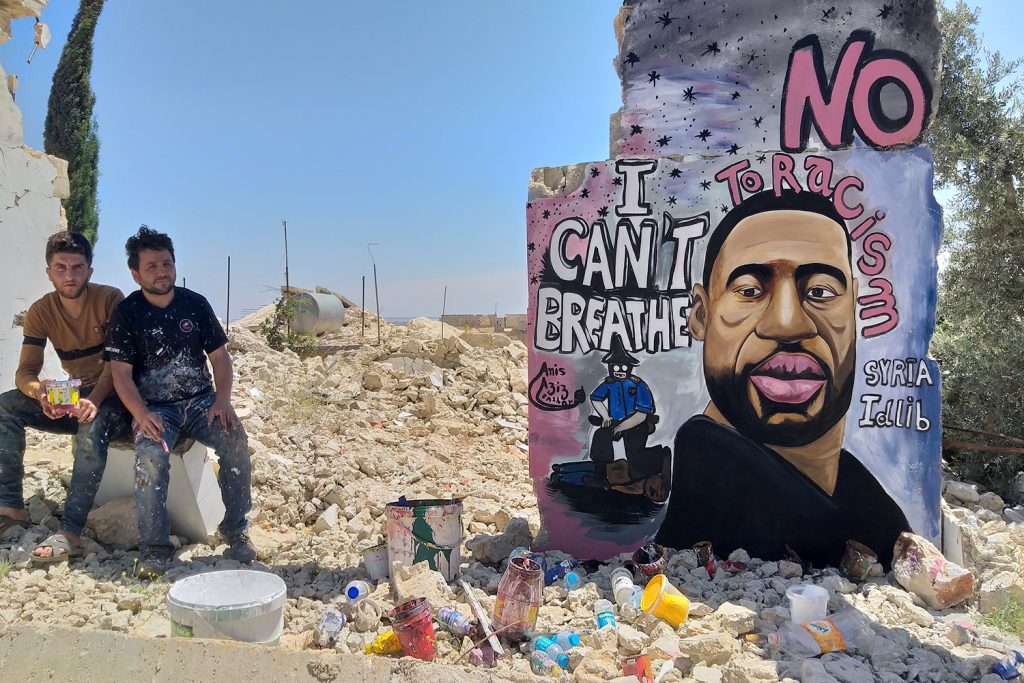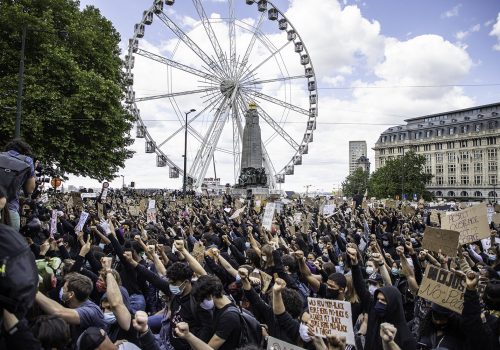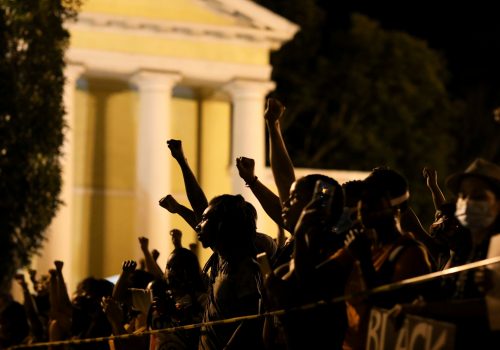حياة العرب السود مهمة أيضاً
بقلم تقى نصيرات
في العالم العربي ، استدعت صور الأمريكيين الذين يحتجون على مقتل جورج فلويد وكل ما يمثله ذكريات عن مظاهرات الربيع العربي التي اجتاحت المنطقة منذ ما يقرب من عقد من الزمن، والتي اشتعلت بالمثل بسبب وحشية الشرطة في قمع المطالب لمزيد من الحرية السياسية والمساواة الاقتصادية
ولكن عندما يتعلق الأمر بجوهر احتجاجات “حياة السود مهمة” (Black Lives Matter) — أي الدعوة إلى إنهاء التمييز العنصري الممنهج والنظامي — لا يرغب العديد من الناس في العالم العربي بالاعتراف بأن مثل هذه القضايا ابتليت بها أيضًا الخليج وبلاد الشام وشمال إفريقيا. وعلى الرغم من الإنكار المعتاد على وجود العنصرية هناك ، إلا أنه في الأسابيع الأخيرة نقلت وسائل التواصل الاجتماعي أصوات العرب السود وغيرهم في المنطقة الذين اغتنموا لحظة الصحوة الأمريكية ليلقوا الضوء على التحيزات القديمة ضد “العرب الأفارقة “- أي العرب الذين يرجع نسبهم إلى جنوب الصحراء الكبرى في أفريقيا – في هذه المنطقة من العالم. وعلى الرغم من أن العرب الأفارقة يشكلون نسبة صغيرة من العرب في جميع أنحاء العالم ، فإنهم يشكلون أقليات كبيرة في مصر وموريتانيا والمغرب والسودان ، كما أنهم موجودون في أماكن أخرى في الشرق الأوسط
في البداية ، شعر “الشارع العربي” (الذي في الغالب في حالة حجر في المنزل بسبب قيود فيروس كورونا) على الإنترنت إلى حد كبير بالصدمة بسبب ظهورهذه الوحشية البوليسية بوقاحة في الولايات المتحدة ، ومن ثم دعم الاحتجاجات المناهضة للعنصرية التي تلت.وبدأ العرب بتذكير بعضهم البعض وبقية العالم بأن المبادئ الإسلامية التي هي أساس نظام القيم في جميع أنحاء المنطقة ترتكز بشكل قوي على المساواة والعدالة. كان الرد الأكثر انتشاراً هو مشاركة الحديث النبوي: “لا فضل لعربي على أعجمي… إلا بالتقوى”. وذكر الكثيرون صاحب الرسول ومؤذنه بلال بن رباح ، الذي يعتبر تحريره من العبودية بعد اعتناقه الإسلام أقدم مثال على تركيز الإسلام على المساواة ورفض العنصرية. وغالبًا ما كانت هذه التعليقات على وسائل التواصل الاجتماعي مصحوبة بصور للمسلمين السود وغير السود يصلون جنبًا إلى جنب، أو صور لتكريم المسلمين السود من قبل ملوك الخليج أو ما شابه. غالبًا ما عبرت هذه التغريدات ورسائل الفيس بوك عن الصدمة بسبب سماح أقوى دولة في العالم لهذه العنصرية المنتشرة بالوصول إلى هذا المستوى وأن تؤدي إلى مثل هذه الانتهاكات للسلطة
وهنا ظهرت الخاصية المتميزة لوسائل التواصل الاجتماعي، حيث يمكن تضخيم أصوات الأقلية على نحو أكبر مما كان ممكنًا من خلال وسائل الإعلام التقليدية. بدأ الضغط في الغالب من العرب الأمريكيين والمسلمين الأمريكيين، واعترف العديد منهم بأن الإشارات النبيلة — والتي في محلها — للمبادئ الإسلامية غالبًا ما يتم نسيانها أو تجاهلها في الممارسة العملية، خاصة بين جيل آبائهم. واعترف المؤثرون البارزون في وسائل التواصل الاجتماعي بأنهم غالبًا ما سمعوا من أقربائهم المتقدمين في السن (وأحيانًا من أقرانهم) مصطلحات مهينة تستخدم لوصف السود، خاصة كلمة “عبيد” المستخدمة لوصف الأشخاص ذوي البشرة الداكنة أو السوداء و لفت آخرون النظر إلى إشارات عنصرية إلى السود المنتشرة في وسائل الإعلام العربية واستخدام طلاء الوجه الأسود في برامج الترفيه العربية. وغالبًا ما يؤدي التحيز للبشرة الفاتحة في وسائل الإعلام إلى التهميش الاقتصادي والاجتماعي للسود في أجزاء مختلفة من العالم العربي
في غضون أيام ، بدأ عدد من النشطاء والأكاديميين والمؤثرين العرب والعرب الأميركيين حملات منسقة لزيادة الوعي حول كيفية مكافحة العنصرية في مجتمعاتهم. فشاركت رنا عبد الحميد ومفاز السويدان بنشر ست طرق لمقاومة العنصرية تجاه السود في المجتمعات العربية ، داعين متابعيهم إلى تثقيف أنفسهم حول تاريخ تجارة الرقيق العربية و “تعلم طرق إذكاء العنصرية ضد السود التي ساهم بها العرب غير السود تاريخياً واستفادوا منها ونشروها“ من بين نصائح عملية أخرى. وقامت حسابات أخرى بترجمة التفسيرات الرائجة لمختلف مظاهر العنصرية إلى العربية. كما أطلق عدد من النشطاء العرب الأمريكيين البارزين مبادرة بعنوان “العرب من أجل حياة السود” تضمنت عريضة (وقعتها عضوة الكونجرس رشيدة طليب وآخرون) يعدون فيها “باستخدام لحظة الغضب والحزن هذه لتجديد الالتزام بالعمل الحتمي الذي يجب علينا القيام به للقضاء على التحيز ضد السود والعنصرية في كل مكان تستمر فيه داخل المجتمع”
شجع الزخم الناتج عن هذه الدعوات العديد من العرب السود، بما في ذلك المؤثرين على وسائل التواصل الاجتماعي والمواطنين العاديين، على التحدث عن العنصرية التي عانوا منها منذ فترة طويلة ولكن نادرًا ما يتحدثون عنها. كان التعليق الأكثر انتشارًا على الإطلاق هو مقطع فيديو أقل من دقيقتين لفنانة الكوميديا الفلسطينية السوداء مريم أبو خالد التي كشفت تجربتها مع “العنصرية غير المقصودة وغير المباشرة” السائدة في الثقافة العربية ولكن غالبًا ما يُنظر إليها بسذاجة على أنها نكت خفيفة ومزاح. مع أكثر من 1.2 مليون مشاهدة فقط على صفحتها على انستجرام ، حظيت مشاركة مريم بردود من العرب السود الآخرين الذين كشفوا عن تجاربهم الصعبة وغيرهم من العرب غير السود الذين شددوا على الحاجة إلى زيادة الوعي بهذه القضايا في مجتمعاتهم
ابتعدت شخصية اليوتيوب السعودية عبير سيندرعن دروسها المعتادة حول المكياج لتستعرض المرة الأولى التي وجهت لها إهانات عنصرية في سن مبكر. وأشارت إلى أنه، عند رفضها لهذه الإهانات، كان يُطلب منها في كثير من الأحيان “ألا تكون حساسة جدًا” وألا “تجعل من الأمر شيئا مهمًا.“ وشددت أريج ، وهي امرأة سودانية شابة تعيش في قطر، في فيديو على إنستجرام على أنه “اذا كان الإسلام يحرم العنصرية فهذا لا يعني أن المسلمين ليسوا عنصريين.“ وشجعت متابعيها على الاعتراف بأن العنصرية ليست مشكلة تواجه الأمريكيين فحسب، بل يجب على العرب التعامل معها أيضًا. وتذكرت المخرجة والصحافية اليمنية نوال المغافي أنها كانت تسمع في طفولتها عادة ملاحظات سلبية وتعليقات عنصرية صريحة أخرى من اقاربها الكبار السن بسبب بشرتها الداكنة
وشدد النشطاء على أن هذه العنصرية لم تؤد فقط إلى خطاب ضار، ولكن أيضًا إلى تهديدات لحياة وسبل عيش العديد من السود الذين يعيشون أو يعملون في العالم العربي، خاصة العمال وخدم المنازل الذين يحظون بالقليل من الحقوق والحماية. وسلط البعض الضوء على نظام الكفالة، الذي يسمح، من لبنان إلى الكويت، لأرباب العمل بحجز جوازات سفر عاملات المنازل وتقييد حريتهم وقدرتهم على الاحتجاج على ظروف العمل السيئة. إنها سياسة يعتبرها العديد من نشطاء حقوق الإنسان شكلاً حديثًا من أشكال العبودية. وفي مصر، لا يزال المجتمع النوبي هدفاً للاهانات العنصرية والتمييز الثقافي والهجمات العنيفة
بالطبع ، وصلت صور الرجال السود الذين استهدفهم ضباط الشرطة البيض من الولايات المتحدة إلى الشرق الأوسط منذ أيام رودني كينغ. وفي أوائل التسعينات ، تم نقل الاحتجاجات وأعمال الشغب التي أعقبت ضرب كينج من خلال وسائل الإعلام العربية والصحف التي تسيطر عليها الدولة والتي كان لها مصلحة في تصوير أمريكا على أنها بعبع. لكن احتجاجات اليوم لم تعد تحت رقابة الدولة. يمكن للعرب اللجوء إلى وسائل التواصل الاجتماعي لمشاهدة مقاطع الفيديو بأنفسهم ومشاهدة الاحتجاجات التي يتم بثها مباشرةً. الأهم من ذلك، يمكنهم إضافة أصواتهم على الفور إلى الحوار الدولي الدائر عبر تويتر أو تيك توك أو انستجرام
قد يشعر العديد من الأمريكيين بالخجل من أن نضالهم ضد العنصرية صار الآن ظاهراً بصورة بارزة على مستوى العالم. ولكن يجب أن يجدوا العزاء في حقيقة أن مطالبهم بالعدالة قد ترددت في جميع أنحاء العالم، وألهمت الأقليات السوداء وحلفائها للضغط بالمثل من أجل زيادة الوعي والتغيير المنهجي ضد العنصرية في العالم العربي وخارجه
تقى نصيرات نائب مدير مركز رفيق الحريري للدراسات الشرق أوسطية في المجلس الأطلسيّ في العاصمة الأمريكية واشنطن.
In the Arab world, images of Americans protesting the killing of George Floyd and all it represents have conjured memories of the Arab Spring demonstrations that swept the region nearly a decade ago, some of which were similarly sparked by incidents of police brutally attempting to suppress demands for more political freedom and economic equality.
But when it comes to the essence of the Black Lives Matter (BLM) protests—the call for an end to systematic and systemic racial discrimination—there is less willingness on the part of many people in the Arab world to acknowledge that such issues also afflict the Gulf, the Levant, and North Africa. In recent weeks, however, social media has amplified the voices of Black Arabs and others in the region, who are seizing on America’s moment of reckoning to shed light on long-standing prejudices against “Afro-Arabs” in this part of the world. Though a small percentage of the worldwide Arab population, Afro-Arabs, who trace their lineage back to sub-Saharan Africa, comprise sizable minorities in Egypt, Mauritania, Morocco, and Sudan, and are also present elsewhere in the Middle East.
At first, the online “Arab street” (mostly locked down at home due to coronavirus restrictions on movement) largely reacted with shock that such police brutality could be displayed so brazenly in the United States, and then support for the anti-racism protests that followed. Arabs began reminding each other and the rest of the world that the Islamic principles that inform much of the value system across the region are firmly rooted in equality and justice. The most ubiquitous response was sharing a prophetic saying, or hadith, attributed to the Prophet Muhammad: “There is no difference between an Arab or non-Arab, except in piety.” Many mentioned the Prophet Muhammad’s companion and muezzin, Bilal ibn Rabah, whose experience of being freed from slavery after he joined the Prophet’s ranks is widely regarded as the earliest example of Islam’s emphasis on equality and rejection of racism. These comments on social media were often accompanied by images of Black and non-Black Muslims praying side by side, or Black Muslims being honored by Gulf monarchs or the like. These tweets and Facebook posts often included expressions of dismay at how the world’s most powerful nation could allow such pervasive racism to reach such levels and result in such abuses of power.
That’s when the unique powers of social media, where minority voices can quickly be amplified beyond what was ever possible through traditional media, kicked in. The pushback began predominantly from Arab-Americans and Muslim-Americans, many of whom were quick to admit that the rightfully lofty references to Islamic principles were too often forgotten or disregarded in practice, especially among their parents’ generation. Prominent social-media influencers admitted that they often heard derogatory terms used to describe Blacks from their elders (and sometimes from their peers), in particular the word abeed, meaning “slave,” being used to describe people with dark or black skin. Others pointed to ubiquitous racist references to Blacks in Arab media and the use of blackface in Arab entertainment. Biases toward pale skin in the media too often translate into the economic and social marginalization of Black populations in various parts of the Arab world.
Within days, a number of prominent Arab and Arab-American social-media activists, academics, and influencers started concerted campaigns to raise awareness about how to combat racism in their communities. Rana Abdelhamid and Mafaz Al-Suwaidan shared “Six Ways for Arabs to Resist Anti-Blackness,” calling on their followers to educate themselves on the history of the Arab slave trade and “learn the ways in which non-Black Arabs historically contributed to, profited from, and promoted anti-Blackness,” among other practical tips. Other accounts translated to Arabic popular explanations of the various manifestations of racism. A number of prominent Arab-American activists launched an initiative titled “Arabs for Black Lives” that featured a petition (signed by Congresswoman Rashida Tlaib, among many others) in which they promise to “take this moment of outrage and mourning to recommit to the imperative work we must do … to eradicate anti-Blackness and racism from anywhere it persists within the community.”
The momentum generated by these calls encouraged numerous Black Arabs, including social media influencers and ordinary citizens, to speak up about the racism they have long endured but rarely vocalized. By far the most widely shared commentary was a less than two-minute video by a Black Palestinian comedian Maryam Abu Khaled who divulged her experience with “unintentional and indirect racism” that was prevalent in Arab culture but often naively viewed as light-hearted jokes and jabs. With over 1.2 million views just on her Instagram page, Maryam’s post was flooded with responses from other Black Arabs who disclosed their own struggles and other non-Black Arabs who stressed the need to raise awareness of these issues in their own communities.
Saudi YouTuber Abeer Sinder stepped away from her usual makeup tutorials and lifestyle vlogs to reflect on the first time she remembers hearing racist slurs hurled at her at a young age. She noted that when she pushes back, she is often told to “not be so sensitive” and not “make it a big deal.” Areej, a young Sudanese woman living in Qatar, emphasized in an Instagram video that “just because Islam outlawed racism doesn’t mean that Muslims aren’t racists.” She encouraged her viewers to acknowledge that racism is not just a problem facing Americans, but one that Arabs have to grapple with as well. Yemeni filmmaker and journalist Nawal Al-Maghafi recalled that as a child she often heard negative references to being dark-skinned and other overtly racist comments from her elders.
Activists stressed that such racism has resulted not just in harmful rhetoric, but also in threats to the lives and livelihoods of many Blacks living or working in the Arab world, namely laborers and domestic workers with few rights and protections. Some highlighted the kafala system, which from Lebanon to Kuwait, allows employers to withhold domestic workers’ passports and severely limit their freedom and ability to protest abusive work conditions. It’s a policy that many human-rights activists consider a modern form of slavery. In Egypt, the Nubian community continues to be a target of racist slurs, cultural discrimination, and violent attacks.
Of course, images of Black men being targeted by white police officers have made their way from the United States to the Middle East since the days of Rodney King. In the early 1990s, the protests and riots that followed King’s beating were conveyed through Arab state media and state-controlled newspapers that had an interest in portraying America as a boogeyman. Today’s protests, however, are no longer filtered through the state. Arabs can turn to social media to see the videos themselves and watch live-streamed protests. More importantly, they can instantly add their voices to the international conversation via Twitter, TikTok, or Instagram.
Many Americans may feel ashamed that their struggle against racism is now on prominent global display. But they should find solace in the fact that their demands for justice have reverberated around the world, and inspired Black minorities and their allies to similarly press for greater awareness and systemic change regarding racism in the Arab world and beyond.
Tuqa Nusairat is the deputy director of the Rafik Hariri Center & Middle East Programs at the Atlantic Council.
Further reading:
Image: Artists Aziz Asmr and Anis Hamdoun pose next to a graffiti of George Floyd in Idlib, Syria June 1, 2020. Mohamad Jamalo/via REUTERS.


